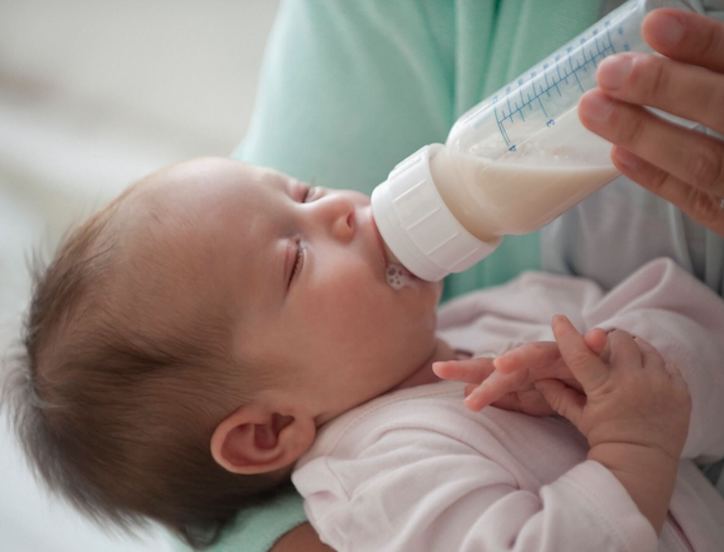The FDA has updated the recalled Cronobacter infant formula list with a full list of recalled products. In addition, they say that metabolic and other medical specialty infant formulas were produced at the same plant which made the recalled Similac PM 60/40, but those products were not recalled “because the FDA has determined that the risk of not having these specialty products available could significantly worsen underlying medical conditions. For many of these patients, the risk of life-threatening adverse events from restricted access to these critically needed products is likely greater than the risk from consuming products that have been produced at the facility.”

So far, at least four infants, who lived in Minnesota, Texas, and Ohio, have been diagnosed with Cronobacter infections after reportedly being fed powdered infant formula produced at Abbott Nutrition’s Sturgis, Michigan plant. Two of the infants who lived in Ohio died. The FDA is investigating to see if Cronobacter contributed to those deaths, and is also investigating more complaints.
Abbott initiated a recall on February 17, 2021, four months after the first case was reported to the FDA from the Minnesota Department of Health. Another recall for a specialty formula, Similac PM 60/40, was issued after the FDA informed the company that a second infant died.
Example of Medical and Specialty Infant Formula Products
These particular infant formulas are not sold in traditional retail stores. They often require a prescription and are sold through specialty pharmacies and medical product suppliers. Some of these products may include:
Glutarex-1
Glutarex-2
Cyclinex-1
Cyclinex-2
Hominex-1
Hominex-2
I-Valex-1
I-Valex-2
Ketonex-1
Ketonex-2
Phenex-1
Phenex-2
Phenex-2 Vanilla
Pro-Phree
Propimex-1
Propimex-2
ProViMin
Calcilo XD
Tyrex-1
Tyrex-2
Similac PM 60/40
The FDA says that parents of infants who need these products should contact their doctors to see if comparable products may be appropriate. If not, parents should follow the CDC’s updated advice about this issue. Powdered infant formula cannot be made sterile, according to manufacturers. Premixed liquid formula, however, is sterile.
FDA Updates the Recalled Cronobacter Infant Formula Product List
Before this update, the recalled product list was vague and varied from store to store. The FDA stated that Similac, EleCare, and Alimentum powdered infant formulas with a code that starts with 22 through 37, the numbers K8, SH, or Z2, and expiration date April 1, 2022 or later were recalled. This is the updated list of recalled products:
Similac Products
Abbott Similac 360 Total Care Infant Formula with Iron
Abbott Similac Advance
Abbott Similac Advance Step-1
Abbott Similac Advance Step-2
Abbott Similac Advance Infant Formula with Iron
Abbott Similac Human Milk Fortifier
Abbott Similac Organic
Abbott Similac Organic with A2 Milk Infant Formula with Iron
Abbott Similac Organic with A2 Milk Toddler Drink
Abbott Similac Organic Toddler with A2 Milk Infant Formula with Iron
Abbott Similac Pro-Advance
Abbott Similac Pro-Advance Infant Formula with Iron
Abbott Similac Pro-Sensitive Infant Formula with Iron
Abbott Similac Pro-Total Comfort Infant Formula with Iron
Abbott Similac Sensitive
Abbott Similac Sensitive Infant Formula with Iron
Abbott Similac Sensitive Lactose Sensitivity
Abbott Similac for Supplementation
Abbott Similac For Spit Up Infant Formula with Iron
Abbott Similac Total Comfort
Abbott Similac Total Comfort Infant Formula with Iron
Abbott Similac EleCare HMO
Abbott Similac EleCare
Abbott EleCare Similac Gold
Abbott EleCare Similac
Abbott Similac PM 60/40 – only lot code 27032K80 (can) / 27032K800 (case)
Alimentum Products
Abbott Infant Formula Powder
Abbott Similac Alimentum
Abbott Similac Alimentum Allergies & Colic Hypoallergenic Infant Formula
Abbott Similac Alimentum with 2′-FL HMO
Abbott Similac Alimentum Eye Q Plus
Abbott Similac Alimentum HMO
Abbott Alimentum HMO
Abbott Similac Alimentum infant formula
Abbott Similac Alimentum Infant Formula with Iron
Abbott Similac Alimentum Toddler Drink
EleCare Products
Abbott EleCare
Abbott EleCare Amino Acid-Based Powder Infant Formula with Iron
Abbott EleCare Infant Formula Unflavoured
Abbott EleCare Junior Vanilla
Abbott EleCare Jr Similac Vanilla
Abbott EleCare Jr Amino Acid-Based Nutrition Powder Unflavored
Abbott EleCare Jr Amino Acid-Based Nutrition Powder Banana
Abbott EleCare Jr Amino Acid-Based Nutrition Powder Chocolate
Abbott EleCare Similac
Abbott EleCare Similac Gold
Abbott Similac EleCare HMO
Abbott Similac EleCare
EleCare LCP Hypoallergenic
The recall also includes Alimentum, EleCare, and Human Milk Fortifier that was produced for markets outside the United States. No other Abbott Nutrition products distributed outside of the United States are affected by this recall.
According to the firm, recalled products were distributed to these countries and locations: Australia, Bahrain, Barbados, Bermuda, Canada, Chile, China, Colombia, Costa Rica, Dominican Republic, Ecuador, Egypt, Guam, Guatemala, Hong Kong, India, Indonesia, Israel, Jordan, Kuwait, Lebanon, Malaysia, Mexico, New Zealand, Oman, Peru, Puerto Rico, Qatar, Saudi Arabia, Singapore, South Africa, Sudan, Taiwan, Thailand, United Arab Emirates, United Kingdom, and Vietnam ANI South.
The FDA is working with Abbott Nutrition “on safe resumption of production at the Sturgis, Michigan facility.” The report also states, “To date, no outbreaks of Cronobacter have been detected using WGS.”
Symptoms of a Cronobacter Infection
If your infant has had an adverse reaction, including a Cronobacter infection, after consuming powdered infant formula, you can report it to the FDA. You can call an FDA Consumer Complaint Coordinator, or you can complete an electronic Voluntary MedWatch form online. Or you can complete a paper form that can be mailed to the FDA. Cronobacter is a reportable condition only in the state of Minnesota.
Symptoms of a Cronobacter infection in infants include poor feeding, excessive crying, a fever, and very low energy. Any infant exhibiting those symptoms should see a doctor as soon as possible, since this infection can progress to meningitis, sepsis, or necrotizing enterocolitis, which all can be life-threatening.

If your infant has been sickened with a Cronobacter or Salmonella infection after consuming recalled infant formula, please contact our experienced attorneys for help at 1-888-377-8900 or text us at 612-261-0856. Our firm represents clients in lawsuits against grocery stores and food processors, and families in wrongful death cases.




